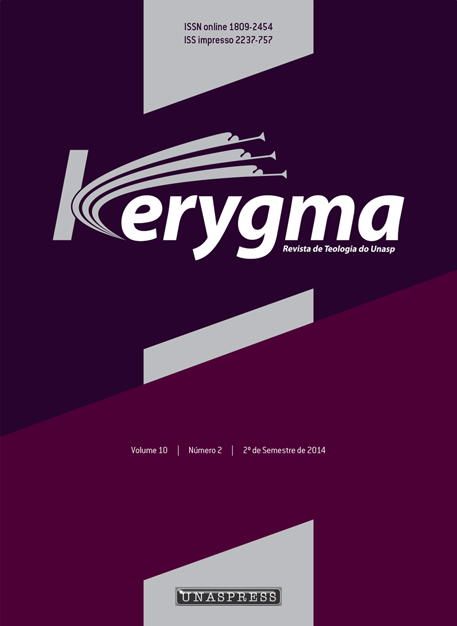O CRESCIMENTO ESPIRITUAL EM UMA UNIVERSIDADE CONFESSIONAL
Abstract
O artigo ressalta inicialmente a importância que a Universidade exerce em movimentos de reforma e reavivamento religioso em nosso mundo. A seguir apresenta um desafio para a vida espiritual de jovens cristãos que ingressam nas universidades públicas e confessionais de nossos dias. Mostra pesquisas recentes que têm indicado um declínio em disciplinas espirituais como estudo da Bíblia, meditação e oração particular (privativa) na vida dos alunos universitários em universidades confessionais. Descreve também a importância da intimidade com Deus no AT e NT tendo três principais instrumentos: O lar, a escola e a igreja. A seguir apresenta as características de universidades que mantêm a tradição religiosa e a identidade cristã. Conclui descrevendo fatores que auxiliam e prejudicam o crescimento espiritual do aluno universitário.
Palavras-chave: Vida espiritual, Disciplinas espirituais, Crescimento espiritual, Universidade confesional.
Abstract: The article begins with a reference to the importance that the university plays in religious and revival movements in our world. Then it presents a challenge to the spiritual life of young Christians who join the public and religious universities of our days. Shows recent researches that reveals a decline in spiritual disciplines as personal bible study, meditation and private prayer in the life of university students in confessional universities. Also describes the importance of intimacy with God in the Old and New Testament as God used three main instruments: the home, the school and the church. Concludes with the characteristics of universities that keep religious tradition and Christian identity. It presents also factors that help and hinder the spiritual growth of the university students.
Keywords: Spiritual life, Spiritual disciplines, Spiritual growth, Religious University.
Downloads
References
ASTIN, A.; ASTIN, H. The spiritual life of college students: a national study of college students’ search for meaning and purpose. Los Angeles: Graduate School of Education & Information Studies University of California, 2005.
BENNE, R. Quality with soul: how six premier colleges and universities keep faith with their religious traditions. Grand Rapids: Eerdmans Publishing Company, 2001.
BURTCHAEL, J. T. The dying of the light: the disengagement of college and universities from heir christian churches. Grand Rapids: Eerdmans Publishing Company, 1998.
CHAMPLIM, R. N. O antigo testamento interpretado: versículo por versículo. São Paulo, SP: Editora Candeia, 1933. (Dicionário – A-L).
CHERRY, C.; DEBERG, B. A.; PORTIFIELD, A. Religion on campus. Chapel Hill: University of North Carolina Press, 2001.
COLEMAN, R. E. O plano mestre de evangelismo. 9. ed. São Paulo: Mundo Cristão, 2003.
DUDLEY, R. L.; GILLESPIE, V. B. Valuegenesis: Faith in the balance. Riverwalk Pkwy: La Sierra University Press, 1992.
KIDDER, S. J. Living with a passion for the presence of God: a call for authentic biblical spirituality. In: MAIER, R. (Ed.). Encountering God in life and mission. Berrien Springs: Department of World Mission of Andrews University, 2010.
LUTZ, S. College ministry in a post-christian culture. Kansas City: Beacon Hill Press, 2011.
SCHULZ, A. Educação superior protestante no Brasil. Engenheiro Coelho: Imprensa Universitária Adventista,2003.
MESLIN, D. História da educação: o pensamento filosófico adventista. Ivatuba: Instituto Adventista Paranaense, 2009.
ORTEGA, J. C. Ações propositivas para o desenvolvimento espiritual dos universitários Adventistas do Sétimo dia do Unasp-HT. Hortolândia: Faculdade Adventista de Hortolândia, 2014.
SANTOS, E. A.; ORTEGA, J. C. A opinião do universitário sobre sua espiritualidade e a vivência numa faculdade confessional adventista. Ivatuba: Instituto Adventista Paranaense, 2010.
SMITH, C.; SNELL, P. Souls in transition. Oxford: Oxford University Press, 2009.
STEVENS, R. P.; GREEN, M. Living the story: biblical spirituality for everyday christians. Grand Rapids: Eerdmans, 2003.
WHITE, E. G. Atos dos apóstolos. 9. ed. Tatuí: Casa Publicadora Brasileira, 2010.
__________. Educação. 9. ed. Tatuí: Casa Publicadora Brasileira, 2008.
__________. O desejado de todas as nações. 22. ed. Tatuí: Casa Publicadora Brasileira, 2006.
__________. O grande conflito. Tatuí: Casa Publicadora Brasileira, 2012.
Downloads
Published
How to Cite
Issue
Section
License
Copyright Statement
In summary, authors who publish in Kerygma must agree that:
-
Once accepted for publication, the copyright of the articles is transferred to Kerygma.
-
All third-party materials used in the text must be properly referenced.
-
Authors must hold the rights or permissions for the use of images, tables, and other graphic materials.
-
Authors guarantee that the submitted manuscript is original, of their own authorship, and has not been submitted or published elsewhere.
-
The opinions and ideas expressed in the texts are the sole responsibility of the authors and do not necessarily reflect the views of the journal.
-
The editors reserve the right to make textual revisions and adjustments in accordance with the journal’s editorial standards.
-
Authors retain copyright and grant the journal the right of first publication, with the work licensed under the Creative Commons Attribution–NonCommercial 4.0 International License.
-
Authors authorize the reproduction and adaptation of the material by Kerygma, with the authors’ participation or express authorization when required.
-
The journal may distribute, store, archive, and make the articles available through any physical or digital means, whether free of charge or paid.
-
Authors may enter into separate agreements for the non-exclusive distribution of the published version of the work, provided that the original publication in Kerygma is acknowledged.
-
Full or partial reproduction of the texts in other publications requires prior written authorization from the editor.
-
Authors are permitted and encouraged to publish and distribute their work online (e.g., in institutional repositories or personal webpages) before or during the editorial process, as this may increase the visibility and citation impact of the published work.










